雅思写作高分范文赏析:Culture Shock
文化冲击 英文作文

文化冲击英文作文Culture shock is a common experience for people who travel or move to a new country. It can be overwhelming to suddenly find yourself in a place with different customs, traditions, and ways of doing things. Everything from the food to the language to the social norms can feelunfamiliar and disorienting.When I first moved to the United States, I was struck by how individualistic the culture was. In my home country, community and family were central to daily life, but in the US, people seemed more focused on their own personal goals and achievements. It took some time for me to adjust tothis new way of thinking and interacting with others.Another aspect of culture shock for me was the language barrier. Even though I had studied English for many years, I found it challenging to understand and communicate with native speakers. Slang, idioms, and regional accents all added to the confusion. I had to learn to be patient withmyself and to keep practicing in order to improve my language skills.One of the most surprising things for me was the different attitudes towards time and punctuality. In my home country, it was common for people to arrive late to social events and meetings, but in the US, being on time was seen as a sign of respect. I had to make a conscious effort to adjust my own habits and be more mindful of punctuality in order to avoid misunderstandings and frustration.The food was also a source of culture shock for me. The flavors, ingredients, and eating habits were so different from what I was used to. I had to expand my palate and try new things, even if they seemed strange or unappealing at first. It was a way for me to embrace the new culture and connect with people through shared meals and culinary experiences.Overall, experiencing culture shock has been both challenging and enriching. It has forced me to step out ofmy comfort zone, confront my own biases and assumptions, and learn to appreciate the diversity of human experience. It has also given me a greater sense of empathy and understanding towards others who may be going through similar experiences.。
关于文化冲击英语作文

关于文化冲击英语作文Culture shock is a common phenomenon experienced by individuals who move to a new country or are exposed to a different cultural environment. It is the feeling of disorientation and discomfort that arises when one's own cultural beliefs and practices are challenged by a new and unfamiliar culture. This essay will delve into the various aspects of culture shock, its stages, and how it can be managed.Understanding Culture ShockCulture shock is not a physical ailment but a psychological response to an unfamiliar environment. It can manifest in different ways such as homesickness, anxiety, and even depression. The initial excitement of experiencing a new culture can quickly fade as the reality of the differences sets in.Stages of Culture Shock1. Honeymoon Phase: This is the initial period where everything seems new and exciting. The individual is enthusiastic and eager to explore the new culture.2. Disillusionment: As the novelty wears off, the individual begins to encounter difficulties in adjusting to the new environment. This is when culture shock starts to set in.3. Adaptation: Over time, the individual starts to understand and adapt to the new culture. They begin to find ways to navigate the cultural differences and find their place within the new society.4. Integration: The final stage is when the individual feels at home in the new culture. They have learned to appreciate the differences and have integrated themselves into the society.Coping Strategies1. Research: Before moving to a new country, it is beneficial to research the culture, customs, and social norms to prepare for the differences.2. Stay Open-Minded: Being open to new experiences andwilling to learn can significantly reduce the impact of culture shock.3. Seek Support: Connecting with others who have experienced culture shock or joining support groups can provide a sense of community and understanding.4. Engage in Local Activities: Participating in local events and activities can help in understanding the culture and integrating into the society.5. Maintain Balance: It is essential to maintain a balance between embracing the new culture and holding onto elementsof one's own culture.ConclusionCulture shock is an inevitable part of adapting to a new environment. It is a process that can be challenging but also enriching. By understanding the stages and adopting coping strategies, individuals can navigate through culture shock and come out with a broader perspective and appreciation for diversity.This essay provides a comprehensive look at culture shock, offering insights into its nature, progression, and ways to manage it effectively. It emphasizes the importance of preparation, adaptability, and maintaining a positiveattitude when encountering a new culture.。
文化冲击英语作文

文化冲击英语作文Cultural Shock。
Cultural shock refers to the feeling of disorientation and confusion that individuals experience when they encounter a new and unfamiliar culture. It is a common phenomenon that people may encounter when they travel to different countries or when they move to a new place with a different culture. In this essay, I will discuss the concept of cultural shock and its impact on individuals.Firstly, cultural shock can be characterized byfeelings of anxiety, confusion, and even frustration. When individuals are exposed to a culture that is significantly different from their own, they may find it difficult to understand the customs, traditions, and social norms of the new culture. This can lead to a sense of being lost and not knowing how to behave appropriately in certain situations. For example, in some cultures, it is considered impolite to make direct eye contact, while in others it is a sign ofrespect. These differences can be confusing and may cause individuals to feel out of place.Moreover, language barriers can also contribute to cultural shock. When individuals are unable to communicate effectively in the local language, it can lead to feelingsof isolation and frustration. Simple tasks such as ordering food or asking for directions can become challenging and may result in individuals feeling helpless and dependent on others. This can be a major source of stress and can hinder individuals from fully immersing themselves in the new culture.Furthermore, cultural shock can also affect individuals emotionally and psychologically. Being exposed to a new culture can challenge one's beliefs, values, and assumptions about the world. Individuals may find themselves questioning their own cultural identity and may experience a sense of homesickness or longing for their familiar surroundings. This can lead to feelings of sadness, loneliness, and even depression.However, it is important to note that cultural shock is not always negative. While it can be initially overwhelming, it can also be a transformative experience that allows individuals to broaden their horizons and gain a deeper understanding and appreciation for different cultures. Through cultural shock, individuals can develop empathy, adaptability, and cross-cultural communication skills,which are valuable in today's globalized world.To effectively cope with cultural shock, individualscan take several steps. Firstly, it is important to educate oneself about the new culture before arriving. This can include learning about the history, customs, and traditions of the country. Additionally, individuals can seek out opportunities to interact with locals and participate in cultural activities, such as festivals or community events. This can help individuals to better understand and appreciate the new culture.In conclusion, cultural shock is a common experience when individuals are exposed to a new and unfamiliar culture. It can be characterized by feelings ofdisorientation, confusion, and anxiety. However, with time and effort, individuals can adapt and overcome cultural shock, gaining a deeper understanding and appreciation for different cultures.。
最新整理雅思写作高分范文赏析:Culture Shock

off. But I know he was not showing off, he was just like to expresses himself.
form a clear question. And if they give the wrong answer it not only hme on their families. Hong Kong students were taught to
(Scarcella, 139). In Hong Kong, students stay in the same classroom with a fixed
seat everyday in a same year while their teachers come to their class to teach
understand the subject very well. In reality, some students mask their emotions
and just act like that to be polite, since they think that if they would ask
them. Therefore, students can have many friends who always do the same things
with them. This helped to build a more close and stable relationship between
文化冲击作文 英文

文化冲击作文英文英文:Culture shock is a common experience for people who travel or move to a new country. It can be defined as the feeling of disorientation and discomfort that arises from being immersed in a culture that is different from one's own. I have personally experienced culture shock when I moved from China to the United States for college.One of the biggest differences I noticed was the communication style. In China, people tend to be more indirect when communicating, using subtle hints and nonverbal cues to convey their meaning. However, in the United States, people are much more direct and straightforward in their communication. I found myself struggling to understand the meaning behind what people were saying, and often felt like I was being too blunt or rude in my own communication.Another aspect of culture shock for me was the food. In China, we eat a lot of rice and noodles, and our meals are often centered around family-style dishes. However, in the United States, there is a much wider variety of foods available, and meals are often more individualized. I found myself missing the comfort and familiarity of my favorite Chinese dishes, and struggled to find new foods that I enjoyed.Despite these challenges, I found that I was able to adapt and learn to appreciate the differences between Chinese and American culture. I made friends with people from all over the world, and we shared our experiences and cultures with each other. I also found that by trying new foods and exploring new places, I was able to broaden my horizons and gain a deeper understanding of the world around me.中文:文化冲击是一个常见的经历,对于那些旅行或移居到新国家的人来说。
雅思写作高分范文赏析:CultureShock
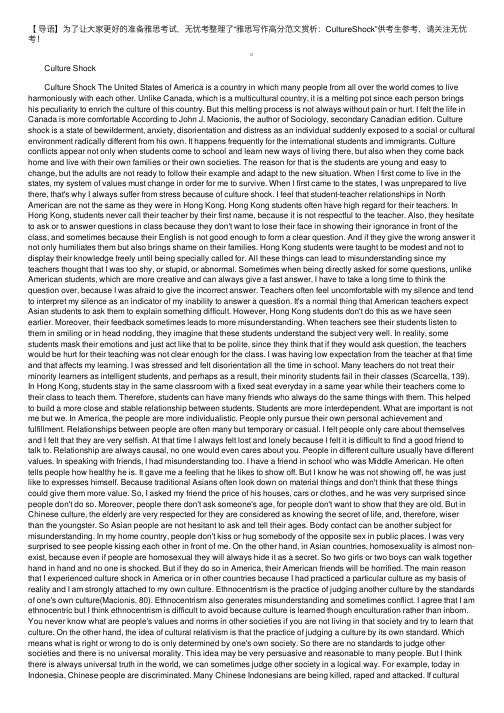
【导语】为了让⼤家更好的准备雅思考试,⽆忧考整理了“雅思写作⾼分范⽂赏析:CultureShock”供考⽣参考,请关注⽆忧考! Culture Shock Culture Shock The United States of America is a country in which many people from all over the world comes to live harmoniously with each other. Unlike Canada, which is a multicultural country, it is a melting pot since each person brings his peculiarity to enrich the culture of this country. But this melting process is not always without pain or hurt. I felt the life in Canada is more comfortable According to John J. Macionis, the author of Sociology, secondary Canadian edition. Culture shock is a state of bewilderment, anxiety, disorientation and distress as an individual suddenly exposed to a social or cultural environment radically different from his own. It happens frequently for the international students and immigrants. Culture conflicts appear not only when students come to school and learn new ways of living there, but also when they come back home and live with their own families or their own societies. The reason for that is the students are young and easy to change, but the adults are not ready to follow their example and adapt to the new situation. When I first come to live in the states, my system of values must change in order for me to survive. When I first came to the states, I was unprepared to live there, that's why I always suffer from stress because of culture shock. I feel that student-teacher relationships in North American are not the same as they were in Hong Kong. Hong Kong students often have high regard for their teachers. In Hong Kong, students never call their teacher by their first name, because it is not respectful to the teacher. Also, they hesitate to ask or to answer questions in class because they don't want to lose their face in showing their ignorance in front of the class, and sometimes because their English is not good enough to form a clear question. And if they give the wrong answer it not only humiliates them but also brings shame on their families. Hong Kong students were taught to be modest and not to display their knowledge freely until being specially called for. All these things can lead to misunderstanding since my teachers thought that I was too shy, or stupid, or abnormal. Sometimes when being directly asked for some questions, unlike American students, which are more creative and can always give a fast answer, I have to take a long time to think the question over, because I was afraid to give the incorrect answer. Teachers often feel uncomfortable with my silence and tend to interpret my silence as an indicator of my inability to answer a question. It's a normal thing that American teachers expect Asian students to ask them to explain something difficult. However, Hong Kong students don't do this as we have seen earlier. Moreover, their feedback sometimes leads to more misunderstanding. When teachers see their students listen to them in smiling or in head nodding, they imagine that these students understand the subject very well. In reality, some students mask their emotions and just act like that to be polite, since they think that if they would ask question, the teachers would be hurt for their teaching was not clear enough for the class. I was having low expectation from the teacher at that time and that affects my learning. I was stressed and felt disorientation all the time in school. Many teachers do not treat their minority learners as intelligent students, and perhaps as a result, their minority students fail in their classes (Scarcella, 139). In Hong Kong, students stay in the same classroom with a fixed seat everyday in a same year while their teachers come to their class to teach them. Therefore, students can have many friends who always do the same things with them. This helped to build a more close and stable relationship between students. Students are more interdependent. What are important is not me but we. In America, the people are more individualistic. People only pursue their own personal achievement and fulfillment. Relationships between people are often many but temporary or casual. I felt people only care about themselves and I felt that they are very selfish. At that time I always felt lost and lonely because I felt it is difficult to find a good friend to talk to. Relationship are always causal, no one would even cares about you. People in different culture usually have different values. In speaking with friends, I had misunderstanding too. I have a friend in school who was Middle American. He often tells people how healthy he is. It gave me a feeling that he likes to show off. But I know he was not showing off, he was just like to expresses himself. Because traditional Asians often look down on material things and don't think that these things could give them more value. So, I asked my friend the price of his houses, cars or clothes, and he was very surprised since people don't do so. Moreover, people there don't ask someone's age, for people don't want to show that they are old. But in Chinese culture, the elderly are very respected for they are considered as knowing the secret of life, and, therefore, wiser than the youngster. So Asian people are not hesitant to ask and tell their ages. Body contact can be another subject for misunderstanding. In my home country, people don't kiss or hug somebody of the opposite sex in public places. I was very surprised to see people kissing each other in front of me. On the other hand, in Asian countries, homosexuality is almost non-exist, because even if people are homosexual they will always hide it as a secret. So two girls or two boys can walk together hand in hand and no one is shocked. But if they do so in America, their American friends will be horrified. The main reason that I experienced culture shock in America or in other countries because I had practiced a particular culture as my basis of reality and I am strongly attached to my own culture. Ethnocentrism is the practice of judging another culture by the standards of one's own culture(Macionis, 80). Ethnocentrism also generates misunderstanding and sometimes conflict. I agree that I am ethnocentric but I think ethnocentrism is difficult to avoid because culture is learned though enculturation rather than inborn. You never know what are people's values and norms in other societies if you are not living in that society and try to learn that culture. On the other hand, the idea of cultural relativism is that the practice of judging a culture by its own standard. Which means what is right or wrong to do is only determined by one's own society. So there are no standards to judge other societies and there is no universal morality. This idea may be very persuasive and reasonable to many people. But I think there is always universal truth in the world, we can sometimes judge other society in a logical way. For example, today in Indonesia, Chinese people are discriminated. Many Chinese Indonesians are being killed, raped and attacked. If culturalrelativism is totally true, then there is no reason for us to think that our peaceful society is better than the violence society that used to practice genocide. Despite all these culture conflicts, I managed to earn American way through schools, colleges and become respectable citizens. Inside this country, there still are many ethnic communities where people from ethnic groups come to share their lives, trade foods, and celebrate festivals. That adds to the diversity of American life and helps mainstream American people to understand more easily other people in the world.。
文化冲击的作文英文

文化冲击的作文英文Culture shock is a real thing. When you find yourselfin a new place, surrounded by different customs, traditions, and ways of life, it can be overwhelming. You might feel disoriented, confused, and even a little bit scared. It's like being thrown into the deep end of a pool without knowing how to swim.The first time I experienced culture shock was when I moved to a foreign country for studies. Everything was so different – the food, the language, the social norms. Ifelt like an outsider, like I didn't belong. It was a tough adjustment, and it took me a while to find my footing.But culture shock isn't all bad. It can also be a learning experience, a chance to broaden your horizons and expand your understanding of the world. You start to see things from a new perspective, and you learn to appreciate the diversity of human experience.One of the most challenging aspects of culture shock is the feeling of isolation. When you're in a new place, far from the familiar faces and places of home, it's easy to feel alone. You miss the comfort of your own culture, and you long for the sense of belonging that comes with it.Another thing that can be difficult about culture shock is the language barrier. When you can't communicate effectively with the people around you, it can be frustrating and isolating. You feel like you're missing out on so much, like you're on the outside looking in.But as time goes on, you start to adapt. You learn the language, you make new friends, and you find ways to connect with the culture around you. You start to feel more at home, and you realize that culture shock is just a temporary hurdle to overcome.In the end, culture shock is a natural part of the experience of exploring new places and meeting new people. It can be challenging, but it's also an opportunity for growth and self-discovery. And when you finally start tofeel at home in this new culture, it's a truly rewarding feeling.。
文化冲击中英文作文
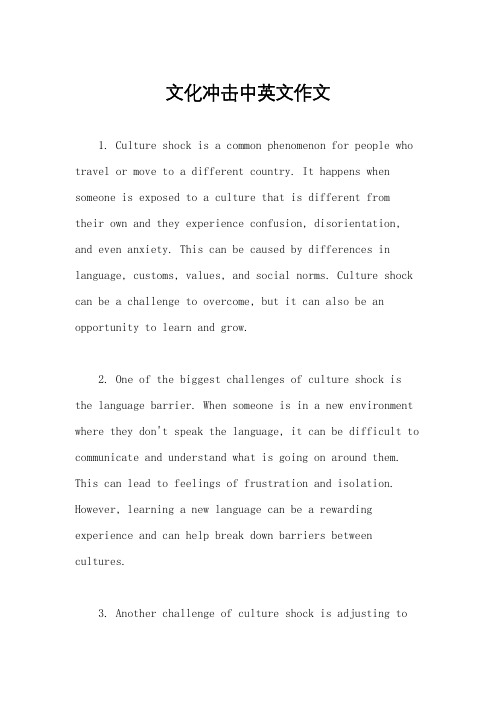
文化冲击中英文作文1. Culture shock is a common phenomenon for people who travel or move to a different country. It happens when someone is exposed to a culture that is different fromtheir own and they experience confusion, disorientation, and even anxiety. This can be caused by differences in language, customs, values, and social norms. Culture shock can be a challenge to overcome, but it can also be an opportunity to learn and grow.2. One of the biggest challenges of culture shock is the language barrier. When someone is in a new environment where they don't speak the language, it can be difficult to communicate and understand what is going on around them. This can lead to feelings of frustration and isolation. However, learning a new language can be a rewarding experience and can help break down barriers between cultures.3. Another challenge of culture shock is adjusting todifferent customs and social norms. For example, in some cultures it is considered rude to be on time, while in others it is expected. In some cultures, it is customary to greet someone with a kiss on the cheek, while in others a handshake is more appropriate. These differences can be confusing and may take some time to get used to.4. Values can also vary greatly between cultures, and this can cause culture shock. For example, in some cultures, individualism is highly valued, while in others,collectivism is more important. This can affect everything from the way people interact with each other to the waythey approach work and education. Understanding these differences can help reduce culture shock and promotecross-cultural understanding.5. Finally, culture shock can be exacerbated by homesickness and feelings of nostalgia for one's own culture. It can be difficult to adjust to a new culture and leave behind the familiar comforts of home. However, it is important to remember that culture shock is a normal partof the process of adapting to a new environment, and thatwith time and effort, it is possible to overcome it and embrace the new culture.。
对文化冲击的看法英语作文

对文化冲击的看法英语作文英文回答:Culture shock refers to the feeling of disorientation and confusion that people experience when they are exposedto a culture that is significantly different from their own. It can occur when traveling to a foreign country, studying abroad, or even when interacting with individuals from different cultural backgrounds in one's own country. Personally, I believe that culture shock can have both positive and negative effects on individuals.On one hand, culture shock can be a source ofexcitement and adventure. Experiencing new customs, traditions, and ways of life can broaden one's horizons and help them develop a more global perspective. For example, when I traveled to Japan, I was initially overwhelmed bythe bustling streets, the language barrier, and the unfamiliar food. However, as I immersed myself in the culture, I began to appreciate the beauty of theirtraditional tea ceremonies, the precision and discipline of martial arts, and the importance they place on respect and harmony. These experiences not only enriched my understanding of Japanese culture but also allowed me to reflect on my own cultural values and norms.On the other hand, culture shock can also be a challenging and stressful experience. The unfamiliarity of the new culture can lead to feelings of homesickness, frustration, and even loneliness. For instance, when I moved to the United States for my studies, I struggled with the different educational system, the fast-paced lifestyle, and the cultural norms that were vastly different from my own. It took time for me to adjust and find my place inthis new environment. However, through this process, I learned to be adaptable, open-minded, and resilient. I also formed strong bonds with fellow international students who were going through a similar experience, which provided a sense of support and belonging.中文回答:文化冲击是指当人们接触到与自己的文化截然不同的文化时所感受到的迷失和困惑。
[英语作文]culture shock
![[英语作文]culture shock](https://img.taocdn.com/s3/m/0d6f11674a73f242336c1eb91a37f111f1850d30.png)
[英语作文]culture shock Title: Navigating the Maelstrom of Culture ShockThe term "culture shock" was first coined to describe the sense of disorientation and confusion experienced by individuals when they are immersed in an unfamiliar culture. This phenomenon can be both exhilarating and unsettling, as it challenges one's established norms, beliefs, and customs. The experience is often characterized by a series of emotional stages that range from initial excitement to eventual adjustment, punctuated by periods of potential frustration and discomfort.When we venture beyond the confines of our cultural comfort zone, we are thrust into an environment where the familiar gives way to the foreign. Everyday interactions, from simple greetings to complex social cues, may differ radically from what we are accustomed to. This can lead to feelings of isolation and even identity crisis, as our usual framework for navigating the world becomes invalid.The initial euphoria of embarking on a new cultural adventure can quickly transition into a state of confusion. Commonplace situations that would normally elicit a predictable response back home can now trigger bouts of uncertainty.A gesture that is friendly in one culture might be deemed rude in another, and misunderstandings can arise from the most innocent of actions.One of the most significant challenges of culture shock is the process of adaptation. It requires a willingness to unlearn ingrained behaviors and to embrace new ways of thinking and being. This can be particularly difficult when the values and norms of the new culture clash with those deeply held since childhood. The pressure to conform while simultaneously maintaining one's own identity can create an internal conflict that is not easily resolved.Over time, however, the tumultuous emotions of culture shock can give way to a deeper understanding and appreciation of the host culture. As we gradually learn the language, understand the customs, and form connections with local communities, a sense of belonging begins to take root. We start to recognize patterns, anticipate reactions, and navigate social situations with increased confidence.This transition is not without its own set of challenges. As we become more acculturated, we may find ourselves distancing from our original culture, potentially leading to a feeling of disconnect from our past. Conversely, we might struggle with the acceptance by the host culture as outsiders, despiteour efforts to integrate.Ultimately, the experience of culture shock is a profound educational journey that broadens our perspective and enhances our ability to relate to people from diverse backgrounds. It teaches us patience, empathy, and adaptability. Through this process, we not only gain a richer understanding of an additional culture but also deepen our insights into our own cultural identity.In conclusion, culture shock is an inevitable aspect of global interaction and personal growth. It serves as a reminder that no matter how similar we may seem on the surface, the differences between cultures are vast and multifaceted. By confronting these differences head-on and learning to thrive amidst them, we become ambassadors of cross-cultural understanding, equipped to bridge gaps and build a more interconnected world.。
文化冲击的英语作文
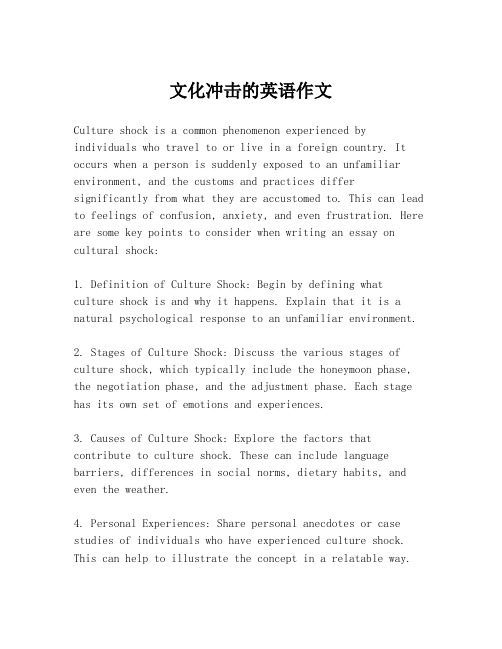
文化冲击的英语作文Culture shock is a common phenomenon experienced by individuals who travel to or live in a foreign country. It occurs when a person is suddenly exposed to an unfamiliar environment, and the customs and practices differsignificantly from what they are accustomed to. This can lead to feelings of confusion, anxiety, and even frustration. Here are some key points to consider when writing an essay on cultural shock:1. Definition of Culture Shock: Begin by defining whatculture shock is and why it happens. Explain that it is a natural psychological response to an unfamiliar environment.2. Stages of Culture Shock: Discuss the various stages of culture shock, which typically include the honeymoon phase, the negotiation phase, and the adjustment phase. Each stage has its own set of emotions and experiences.3. Causes of Culture Shock: Explore the factors that contribute to culture shock. These can include language barriers, differences in social norms, dietary habits, and even the weather.4. Personal Experiences: Share personal anecdotes or case studies of individuals who have experienced culture shock. This can help to illustrate the concept in a relatable way.5. Coping Strategies: Offer suggestions on how to cope with culture shock. This might include learning the local language, joining social groups, or seeking support from others whohave experienced similar situations.6. Benefits of Overcoming Culture Shock: Highlight thepositive aspects of culture shock, such as personal growth, increased adaptability, and a broader understanding of the world.7. Conclusion: Conclude by summarizing the main points and emphasizing the importance of being prepared for and understanding culture shock.Remember to use clear and concise language, provide examplesto support your points, and maintain a logical flowthroughout your essay.。
文化冲击 英语作文
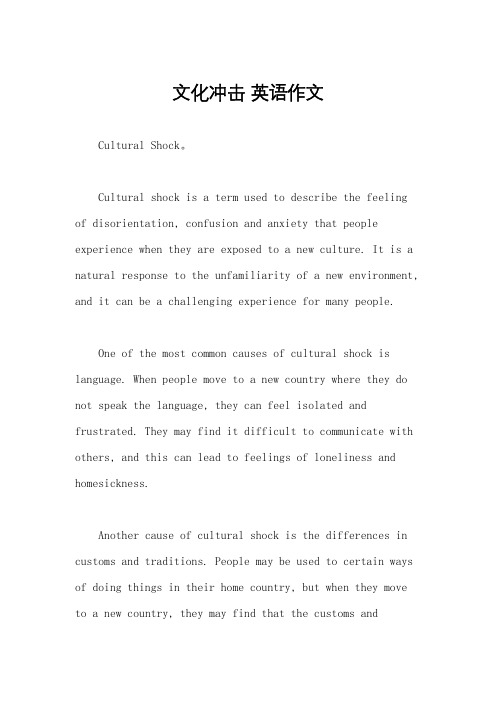
文化冲击英语作文Cultural Shock。
Cultural shock is a term used to describe the feeling of disorientation, confusion and anxiety that people experience when they are exposed to a new culture. It is a natural response to the unfamiliarity of a new environment, and it can be a challenging experience for many people.One of the most common causes of cultural shock is language. When people move to a new country where they do not speak the language, they can feel isolated and frustrated. They may find it difficult to communicate with others, and this can lead to feelings of loneliness and homesickness.Another cause of cultural shock is the differences in customs and traditions. People may be used to certain ways of doing things in their home country, but when they move to a new country, they may find that the customs andtraditions are very different. This can be especially difficult for people who are used to a strong sense of community and social support.In addition to language and customs, there are many other factors that can contribute to cultural shock. For example, people may find that the food is very different, or that the climate is much colder or warmer than they are used to. They may also encounter different attitudes towards religion, politics, and social issues.Despite the challenges of cultural shock, there are many ways to cope with the experience. One of the most important things is to keep an open mind and be willing to learn about the new culture. This can involve trying new foods, learning the language, and participating in cultural events.Another important strategy is to seek out support from others who have experienced cultural shock. This can include joining a local expat group, seeking out a counselor or therapist, or simply talking to friends andfamily about the experience.Ultimately, cultural shock can be a difficult experience, but it can also be a valuable opportunity for personal growth and learning. By embracing the new culture and seeking out support, people can overcome the challenges and thrive in their new environment.。
culture shock的英语作文
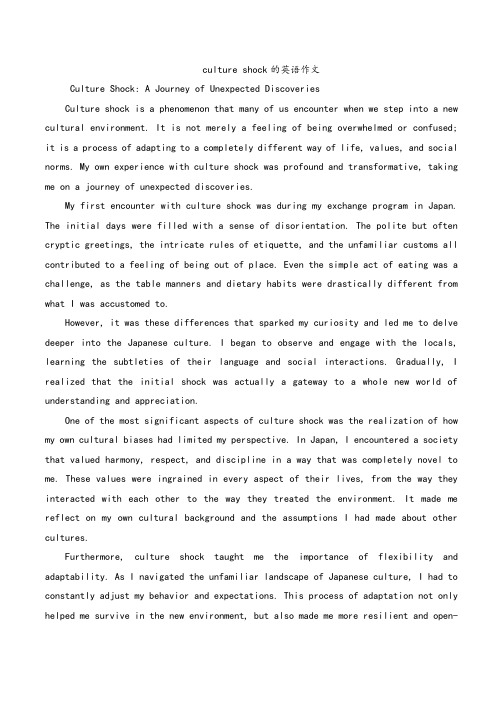
culture shock的英语作文Culture Shock: A Journey of Unexpected DiscoveriesCulture shock is a phenomenon that many of us encounter when we step into a new cultural environment. It is not merely a feeling of being overwhelmed or confused; it is a process of adapting to a completely different way of life, values, and social norms. My own experience with culture shock was profound and transformative, taking me on a journey of unexpected discoveries.My first encounter with culture shock was during my exchange program in Japan. The initial days were filled with a sense of disorientation. The polite but often cryptic greetings, the intricate rules of etiquette, and the unfamiliar customs all contributed to a feeling of being out of place. Even the simple act of eating was a challenge, as the table manners and dietary habits were drastically different from what I was accustomed to.However, it was these differences that sparked my curiosity and led me to delve deeper into the Japanese culture. I began to observe and engage with the locals, learning the subtleties of their language and social interactions. Gradually, I realized that the initial shock was actually a gateway to a whole new world of understanding and appreciation.One of the most significant aspects of culture shock was the realization of how my own cultural biases had limited my perspective. In Japan, I encountered a society that valued harmony, respect, and discipline in a way that was completely novel to me. These values were ingrained in every aspect of their lives, from the way they interacted with each other to the way they treated the environment. It made me reflect on my own cultural background and the assumptions I had made about other cultures.Furthermore, culture shock taught me the importance of flexibility and adaptability. As I navigated the unfamiliar landscape of Japanese culture, I had to constantly adjust my behavior and expectations. This process of adaptation not only helped me survive in the new environment, but also made me more resilient and open-minded in my daily life.In conclusion, culture shock is not just a challenge; it is an opportunity for growth and discovery. It pushes us to broaden our horizons, question our assumptions, and develop a deeper understanding of the world's diverse cultures. While the initial shock may be overwhelming, it is the journey that follows that truly transforms us.。
关于文化冲击英语翻译作文

Cultural shock is a common phenomenon that many people experience when they move to a new country or are exposed to a different culture.It is a feeling of confusion, anxiety,and discomfort that arises when ones own cultural norms and values are challenged by those of a different culture.In this essay,we will explore the concept of cultural shock,its causes,and how it can be managed.Understanding Cultural ShockCultural shock is often described as a process that occurs in four stages:1.Honeymoon Phase:Initially,individuals are excited and fascinated by the new culture. They are eager to learn and experience everything that is different.2.Hostility Phase:As the novelty wears off,individuals may start to feel overwhelmed by the differences and begin to miss their home culture.This can lead to frustration and hostility towards the new culture.3.Adjustment Phase:Over time,individuals start to adapt to the new culture.They learn to navigate the cultural norms and values,and begin to feel more comfortable.4.Acceptance Phase:Finally,individuals reach a stage where they fully embrace the new culture.They have integrated the new cultural norms and values into their own,and feel at home.Causes of Cultural ShockThe causes of cultural shock can be varied and are often related to the differences between the home culture and the host culture.Some of the common causes include:Language Barrier:Communication is a fundamental part of human interaction.When individuals cannot communicate effectively due to language differences,it can lead to misunderstandings and feelings of isolation.Social Norms:Different cultures have different social norms and expectations.What is considered polite or acceptable in one culture may be seen as rude or inappropriate in another.Food and Eating Habits:Food is a significant part of any culture.The unfamiliarity of new food and eating habits can be a source of discomfort for many.Value Systems:Deeply ingrained values and beliefs can clash when individuals from different cultures interact.This can lead to feelings of confusion and conflict.Managing Cultural ShockManaging cultural shock involves several strategies that can help individuals adapt to the new culture.These include:Openmindedness:Being open to new experiences and willing to learn about the host culture can help reduce feelings of anxiety and confusion.Seeking Support:Connecting with others who are experiencing similar challenges can provide a sense of community and support.Learning the Language:Efforts to learn the local language can significantly improve communication and understanding of the host culture.Respecting Differences:Recognizing that cultural differences are a part of the human experience and respecting them can help foster a more harmonious relationship with the host culture.SelfCare:Taking care of ones physical and emotional wellbeing is crucial during the adjustment period.This can include maintaining a healthy lifestyle,seeking professional help if needed,and finding time for relaxation and leisure activities.In conclusion,cultural shock is a complex process that can be challenging but also enriching.By understanding its stages,recognizing its causes,and employing effective strategies for management,individuals can navigate this experience and ultimately benefit from the cultural exchange.。
文化休克 英文作文
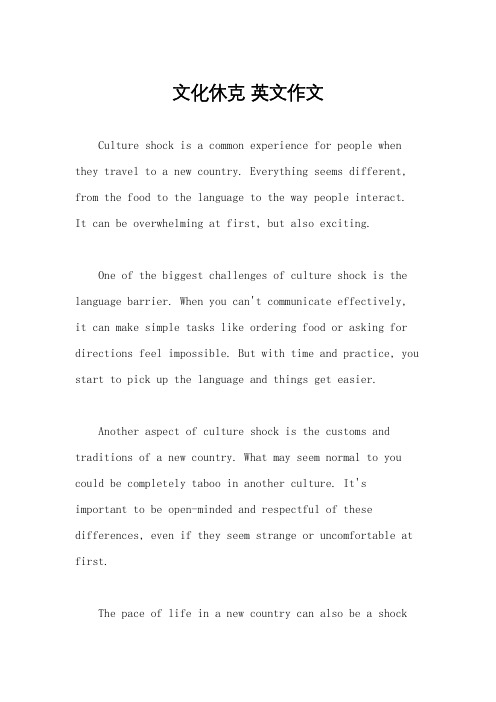
文化休克英文作文Culture shock is a common experience for people when they travel to a new country. Everything seems different, from the food to the language to the way people interact. It can be overwhelming at first, but also exciting.One of the biggest challenges of culture shock is the language barrier. When you can't communicate effectively, it can make simple tasks like ordering food or asking for directions feel impossible. But with time and practice, you start to pick up the language and things get easier.Another aspect of culture shock is the customs and traditions of a new country. What may seem normal to you could be completely taboo in another culture. It's important to be open-minded and respectful of these differences, even if they seem strange or uncomfortable at first.The pace of life in a new country can also be a shockto the system. Some cultures are more laid-back, while others are fast-paced and competitive. Adapting to a new way of life can be challenging, but it can also be an opportunity for personal growth and self-discovery.Overall, culture shock is a natural part of the travel experience. It may be difficult at times, but it's also a chance to learn about yourself and the world around you. Embrace the differences, challenge your assumptions, and you'll come out on the other side with a broader perspective and a deeper understanding of the world.。
cultural shock英语作文
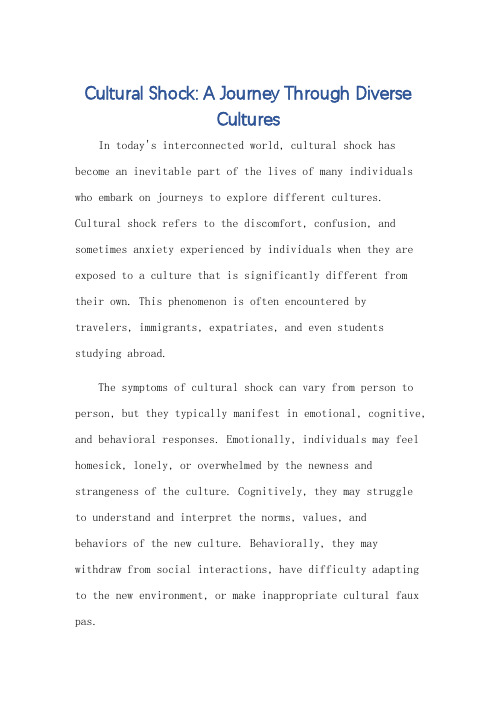
Cultural Shock: A Journey Through DiverseCulturesIn today's interconnected world, cultural shock has become an inevitable part of the lives of many individuals who embark on journeys to explore different cultures. Cultural shock refers to the discomfort, confusion, and sometimes anxiety experienced by individuals when they are exposed to a culture that is significantly different from their own. This phenomenon is often encountered by travelers, immigrants, expatriates, and even students studying abroad.The symptoms of cultural shock can vary from person to person, but they typically manifest in emotional, cognitive, and behavioral responses. Emotionally, individuals may feel homesick, lonely, or overwhelmed by the newness and strangeness of the culture. Cognitively, they may struggleto understand and interpret the norms, values, andbehaviors of the new culture. Behaviorally, they may withdraw from social interactions, have difficulty adapting to the new environment, or make inappropriate cultural faux pas.The stages of cultural shock also vary among individuals, but they generally follow a pattern of adjustment. The initial stage is often characterized by excitement and curiosity about the new culture. However, as time passes and the initial euphoria fades, individuals may enter a period of disillusionment and disappointment as they encounter the challenges and difficulties of cultural adaptation. This stage can be particularly difficult as individuals may feel a sense of loss and displacement.The next stage is often marked by a period of adjustment and accommodation as individuals begin to understand and accept the new culture. They may start to develop new coping strategies and behaviors that help them navigate the new environment. During this stage,individuals may also begin to identify with the new culture and even embrace it as their own.Finally, the last stage of cultural shock is marked by a sense of mastery and comfort as individuals have fully adapted to the new culture. They may have developed a new identity that incorporates both their own cultural heritage and the new culture. At this stage, individuals may evenfeel a sense of belonging and connectedness to the new culture.Dealing with cultural shock requires patience, understanding, and an open mind. It is important to recognize that every culture has its own unique norms, values, and behaviors, and that it is okay to feel lost and confused at times. It is also essential to maintain a positive attitude and to seek out support from others who have experienced similar situations.In conclusion, cultural shock is a natural part of the process of cultural adaptation. By understanding the stages of cultural shock and developing strategies to cope with it, individuals can overcome the challenges and difficulties of cultural adaptation and embrace the rich and diverse experiences that lie ahead.**文化冲击:穿越多元文化的旅程**在当今互联互通的世界里,文化冲击已经成为许多踏上探索不同文化之旅的人不可避免的一部分。
英语作文culture shock

英语作文culture shock(中英文实用版)English:Culture shock is an inevitable experience for those who venture into the unknown realms of a different culture.It"s like a rollercoaster ride, filled with ups and downs, as one tries to navigate through the labyrinth of unfamiliar customs, traditions, and social norms.From the moment I stepped into the bustling streets of Tokyo, I was overwhelmed by the vibrant fusion of ancient rituals and futuristic technology.The politeness and formality in interactions took me by surprise, a stark contrast to the casual informality back home.Yet, amidst the chaos of cultural differences, lies the beauty of adaptation and growth, a journey that shapes one"s perspective and broadens their horizons.中文:文化冲击对于那些勇敢踏入不同文化领域的人来说是一种无法避免的经历。
这就像是一场过山车之旅,充满了起伏,因为一个人试图穿越充满陌生习俗、传统和社会规范的迷宫。
解释cultural shock英语作文
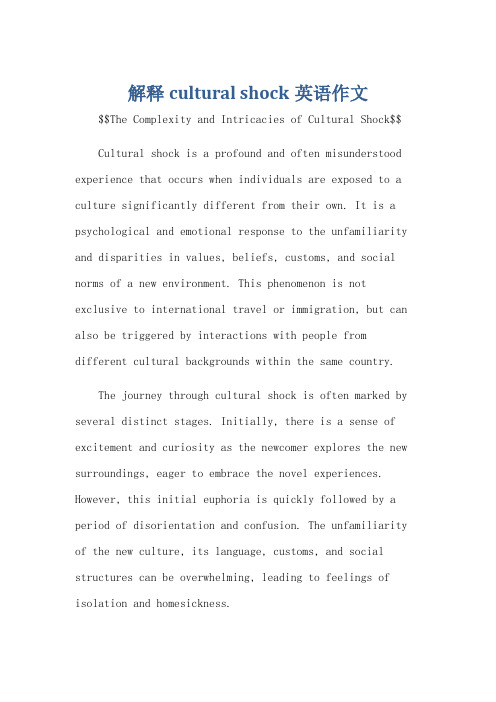
解释cultural shock英语作文$$The Complexity and Intricacies of Cultural Shock$$ Cultural shock is a profound and often misunderstood experience that occurs when individuals are exposed to a culture significantly different from their own. It is a psychological and emotional response to the unfamiliarity and disparities in values, beliefs, customs, and social norms of a new environment. This phenomenon is not exclusive to international travel or immigration, but can also be triggered by interactions with people from different cultural backgrounds within the same country. The journey through cultural shock is often marked by several distinct stages. Initially, there is a sense of excitement and curiosity as the newcomer explores the new surroundings, eager to embrace the novel experiences. However, this initial euphoria is quickly followed by a period of disorientation and confusion. The unfamiliarity of the new culture, its language, customs, and social structures can be overwhelming, leading to feelings of isolation and homesickness.The third stage is often characterized by a sense of frustration and anger. As the newcomer struggles to adapt to the new cultural norms, they may encounter misunderstandings, rejection, and even discrimination. These challenges can lead to feelings of helplessness and a desire to return to the familiarity of their own culture. Gradually, however, a process of accommodation and adaptation begins. The newcomer starts to understand and appreciate the values and practices of the new culture, and may even begin to adopt some of them. They learn to navigate the social landscape, to communicate effectively, and to establish new relationships. This process is not without its challenges, but it is also a time of personal growth and discovery.The final stage of cultural shock is often marked by a sense of integration and acceptance. The newcomer has now become a more informed and understanding member of the new culture, able to appreciate its uniqueness while maintaining their own cultural identity. They have overcome the initial difficulties and have emerged stronger and more resilient.It is important to note that cultural shock is not a linear process, and individuals may experience its stagesin different orders or with varying intensities. Some people may adapt quickly and easily to new cultural environments, while others may struggle for longer periods. Additionally, the experience of cultural shock can be influenced by a range of factors, including personal characteristics, past experiences, and the degree of similarity or difference between the two cultures.Moreover, cultural shock is not always a negative experience. While it can be challenging and uncomfortable at times, it also presents an opportunity for personal growth and transformation. It forces individuals to question their own values and beliefs, to step out of their comfort zones, and to embrace new perspectives and experiences. In this way, cultural shock can be a catalyst for personal development and a rich source of life lessons. In conclusion, cultural shock is a complex and multifaceted experience that is inherent in any significant cross-cultural encounter. It challenges individuals to navigate new environments and adapt to unfamiliar culturalnorms, often leading to personal growth and transformation. While it can be difficult and uncomfortable at times, it is also an enriching experience that can broaden one's horizons and deepen one's understanding of the world. By embracing cultural shock and actively seeking to understand and adapt to new cultures, individuals can expand their cultural horizons and enrich their lives in ways they may never have imagined.。
文化冲击话题英语作文
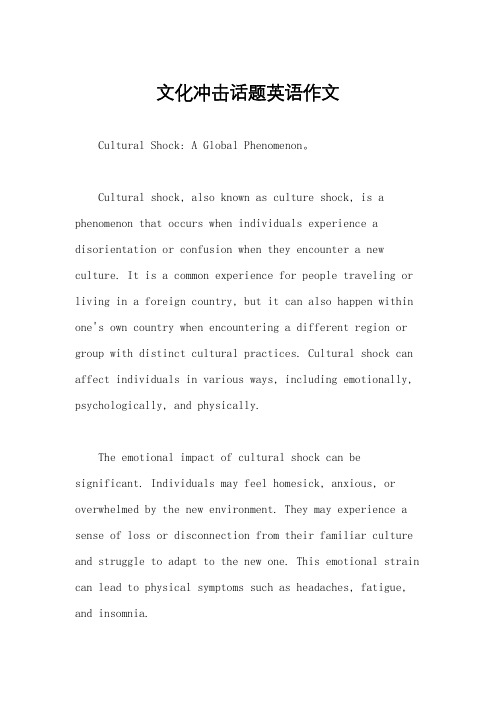
文化冲击话题英语作文Cultural Shock: A Global Phenomenon。
Cultural shock, also known as culture shock, is a phenomenon that occurs when individuals experience a disorientation or confusion when they encounter a new culture. It is a common experience for people traveling or living in a foreign country, but it can also happen within one's own country when encountering a different region or group with distinct cultural practices. Cultural shock can affect individuals in various ways, including emotionally, psychologically, and physically.The emotional impact of cultural shock can be significant. Individuals may feel homesick, anxious, or overwhelmed by the new environment. They may experience a sense of loss or disconnection from their familiar culture and struggle to adapt to the new one. This emotional strain can lead to physical symptoms such as headaches, fatigue, and insomnia.Psychologically, cultural shock can challenge an individual's beliefs, values, and assumptions about the world. It can force them to confront their own cultural biases and prejudices, which can be uncomfortable and unsettling. Additionally, cultural shock can lead to asense of identity crisis as individuals struggle toreconcile their own cultural background with the new one they are experiencing.There are several stages of cultural shock that individuals typically go through when encountering a new culture. The first stage is often characterized by excitement and curiosity about the new environment. However, as individuals begin to encounter the differences in culture, they may enter a stage of frustration and confusion. This can be followed by a stage of adjustment as individuals begin to adapt to the new culture and find ways to navigate it. Finally, individuals may reach a stage of acceptance and integration, where they feel comfortable and at home in the new culture.Cultural shock can have both positive and negative effects on individuals. On the one hand, it can broaden their perspectives and expose them to new ideas and ways of life. It can also challenge them to become more adaptable and resilient in the face of change. On the other hand, cultural shock can be a stressful and overwhelming experience that can negatively impact an individual's mental and physical health.To mitigate the negative effects of cultural shock, individuals can take several steps. These include learning about the new culture before arriving, seeking out support from others who have experienced cultural shock, and maintaining connections with their familiar culture. Additionally, individuals can try to maintain a positive attitude and approach the new culture with an open mind.In conclusion, cultural shock is a global phenomenon that can affect individuals in various ways. It is a common experience for people traveling or living in a foreign country, but it can also happen within one's own country. Cultural shock can have both positive and negative effectson individuals, and it is important to take steps to mitigate the negative effects. By approaching the new culture with an open mind and seeking out support, individuals can successfully navigate the challenges of cultural shock and ultimately benefit from the experience.。
文化冲击 作文 英语
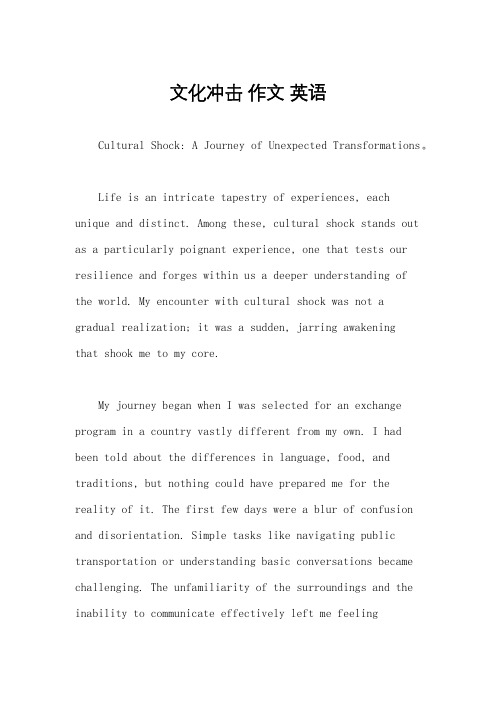
文化冲击作文英语Cultural Shock: A Journey of Unexpected Transformations。
Life is an intricate tapestry of experiences, each unique and distinct. Among these, cultural shock stands out as a particularly poignant experience, one that tests our resilience and forges within us a deeper understanding ofthe world. My encounter with cultural shock was not a gradual realization; it was a sudden, jarring awakeningthat shook me to my core.My journey began when I was selected for an exchange program in a country vastly different from my own. I had been told about the differences in language, food, and traditions, but nothing could have prepared me for thereality of it. The first few days were a blur of confusion and disorientation. Simple tasks like navigating public transportation or understanding basic conversations became challenging. The unfamiliarity of the surroundings and the inability to communicate effectively left me feelingisolated and lost.The most profound impact of cultural shock, however, was not the logistical difficulties. It was the emotional turmoil that it unleashed. I found myself constantly comparing my new surroundings to what I was familiar with, longing for the comfort of my old life. I missed the familiar sights, sounds, and smells of home. I struggled with feelings of。
- 1、下载文档前请自行甄别文档内容的完整性,平台不提供额外的编辑、内容补充、找答案等附加服务。
- 2、"仅部分预览"的文档,不可在线预览部分如存在完整性等问题,可反馈申请退款(可完整预览的文档不适用该条件!)。
- 3、如文档侵犯您的权益,请联系客服反馈,我们会尽快为您处理(人工客服工作时间:9:00-18:30)。
雅思写作高分范文赏析:Culture Shock导读:本文雅思写作高分范文赏析:Culture Shock,仅供参考,如果觉得很不错,欢迎点评和分享。
Culture ShockCulture Shock The United States of America is a country in which manypeople from all over the world comes to live harmoniously with each other.Unlike Canada, which is a multicultural country, it is a melting pot since eachperson brings his peculiarity to enrich the culture of this country. But thismelting process is not always without pain or hurt. I felt the life in Canada ismore comfortable According to John J. Macionis, the author of Sociology,secondary Canadian edition. Culture shock is a state of bewilderment, anxiety,disorientation and distress as an individual suddenly exposed to a social orcultural environment radically different from his own. It happens frequently forthe international students and immigrants. Culture conflicts appear not onlywhen students come to school and learn new ways of living there, but also whenthey come back home and live with their own families or their own societies. Thereason for that is the students are young and easy to change, but the adults arenot ready to follow their example and adapt to the new situation. When I firstcome to live in the states, my system of values must change in order for me tosurvive. When I first came to the states, I was unprepared to live there, that'swhy I always suffer from stress because of culture shock. I feel thatstudent-teacher relationships in North American are not the same as they were inHong Kong. Hong Kong students often have high regard for their teachers. In HongKong, students never call their teacher by their first name, because it is notrespectful to the teacher. Also, they hesitate to ask or to answer questions inclass because they don't want to lose their face in showing their ignorance infront of the class, and sometimes because their English is not good enough toform a clear question. And if they give the wrong answer it not only humiliatesthem but also brings shame on their families. Hong Kong students were taught tobe modest and not to display their knowledge freely until being specially calledfor. All these things can lead to misunderstanding since my teachers thoughtthat I was too shy, or stupid, or abnormal. Sometimes when being directly askedfor some questions, unlike American students, which are more creative and canalways give a fast answer, I have to take a long time to think the questionover, because I was afraid to give the incorrect answer. Teachers often feeluncomfortable with my silence and tend to interpret my silence as an indicatorof my inability to answer a question. It's a normal thing that American teachersexpect Asian students to ask them to explain something difficult. However, HongKong students don't do this as we have seen earlier. Moreover, their feedbacksometimes leads to more misunderstanding. When teachers see their studentslisten to them in smiling or in head nodding, they imagine that these studentsunderstand the subject very well. In reality, some students mask their emotionsand just act like that to be polite, since they think that if they would askquestion, the teachers would be hurt for their teaching was not clear enough forthe class. I was having low expectation from the teacher at that time and thataffects my learning. I was stressed and felt disorientation all the time inschool. Many teachers do not treat their minority learners as intelligentstudents, and perhaps as a result, their minority students fail in their classes(Scarcella, 139). In Hong Kong, students stay in the same classroom with a fixedseat everyday in a same year while their teachers come to their class to teachthem. Therefore, students can have many friends who always do the same thingswith them. This helped to build a more close and stable relationship betweenstudents. Students are more interdependent. What are important is not me but we.In America, the people are more individualistic. People only pursue their ownpersonal achievement and fulfillment. Relationships between people are oftenmany but temporary or casual. I felt people only care about themselves and Ifelt that they are very selfish. At that time I always felt lost and lonelybecause I felt it is difficult to find a good friend to talk to. Relationshipare always causal, no one would even cares about you. People in differentculture usually have different values. In speaking with friends, I hadmisunderstanding too. I have a friend in school who was Middle American. Heoften tells people how healthy he is. It gave me a feeling that he likes to showoff. But I know he was not showing off, he was just like to expresses himself.Because traditional Asians often look down on material things and don't thinkthat these things could give them more value. So, I asked my friend the price ofhis houses, cars or clothes, and he was very surprised since people don't do so.Moreover, people there don't ask someone's age, for people don't want to showthat they are old. But in Chinese culture, the elderly are very respected forthey are considered as knowing the secret of life, and, therefore, wiser thanthe youngster. So Asian people are not hesitant to ask and tell their ages. Bodycontact can be another subject for misunderstanding. In my home country, peopledon't kiss or hug somebody of the opposite sex in public places. I was verysurprised to see people kissing each other in front of me. On the other hand, inAsian countries, homosexuality is almost non- exist, because even if people arehomosexual they will always hide it as a secret. So two girls or two boys canwalk together hand in hand and no one is shocked. But if they do so in America,their American friends will be horrified. The main reason that I experiencedculture shock in America or in other countries because I had practiced aparticular culture as my basis of reality and I am strongly attached to my ownculture. Ethnocentrism is the practice of judging another culture by thestandards of one's own culture(Macionis, 80). Ethnocentrism also generatesmisunderstanding and sometimes conflict. I agree that I am ethnocentric but Ithink ethnocentrism is difficult to avoid because culture is learned thoughenculturation rather than inborn. You never know what are people's values andnorms in other societies if you are not living in that society and try to learnthat culture. On the other hand, the idea of cultural relativism is that thepractice of judging a culture by its own standard. Which means what is right orwrong to do is only determined by one's own society. So there are no standardsto judge other societies and there is no universal morality. This idea may bevery persuasive and reasonable to many people. But I think there is alwaysuniversal truth in the world, we can sometimes judge other society in a logicalway. For example, today in Indonesia, Chinese people are discriminated. ManyChinese Indonesians are being killed, raped and attacked. If cultural relativismis totally true, then there is no reason for us to think that our peacefulsociety is better than the violence society that used to practice genocide.Despite all these culture conflicts, I managed to earn American way throughschools, colleges and become respectable citizens. Inside this country, therestill are many ethnic communities where people from ethnic groups come to sharetheir lives, trade foods, and celebrate festivals. That adds to the diversity ofAmerican life and helps mainstream American people to understand more easilyother people in the world.。
